Impact of Entrepreneurial Ventures on UK Economy Report
VerifiedAdded on 2020/10/22
|16
|4908
|110
Report
AI Summary
This report provides a comprehensive analysis of entrepreneurial ventures, examining various types such as serial entrepreneurs, owner-managers, scalable startups, small-level organizations, large-scale ventures, and social enterprises. It explores the similarities and differences between these ventures, focusing on aspects like marketing, resources, and scalability. The report investigates the impact of micro and small enterprises (SMEs) on the growth and development of the UK economy, highlighting their crucial role in job creation and economic recovery, particularly after Brexit. Furthermore, it analyzes the characteristics, traits, and skills of successful entrepreneurs, emphasizing the influence of background and experience on fostering or hindering entrepreneurial endeavors. The report concludes by summarizing key findings and implications for the entrepreneurial landscape in the UK.
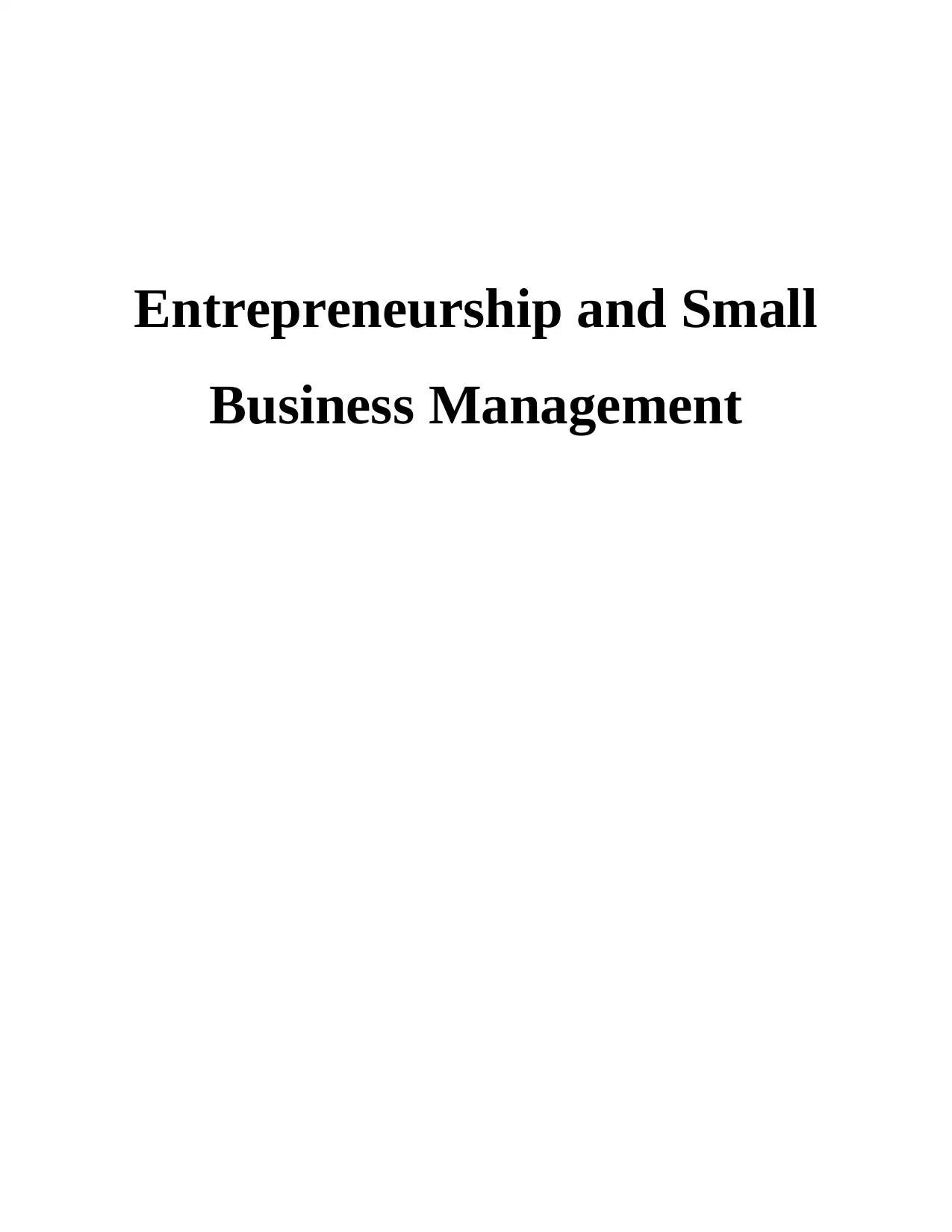
Entrepreneurship and Small
Business Management
Business Management
Paraphrase This Document
Need a fresh take? Get an instant paraphrase of this document with our AI Paraphraser
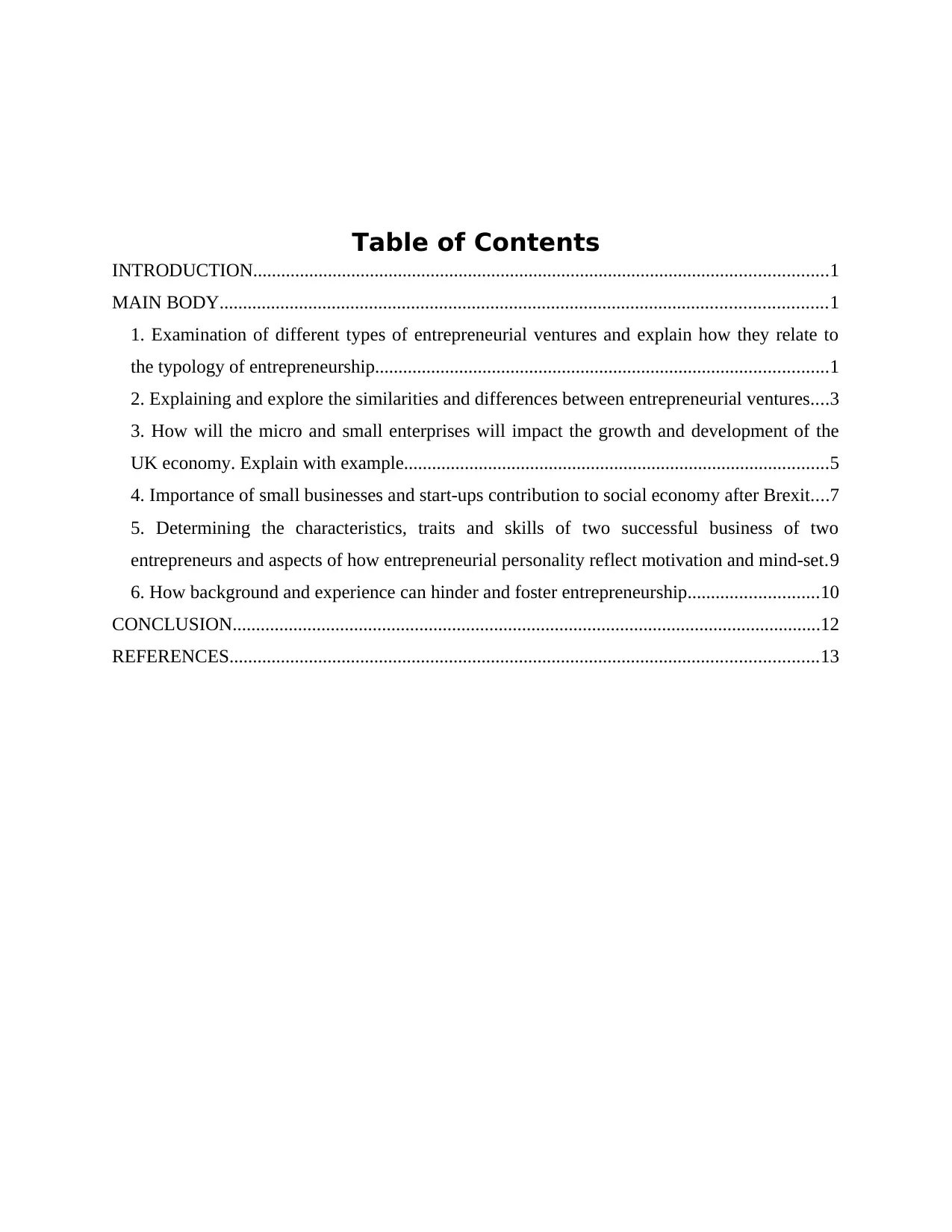
Table of Contents
INTRODUCTION...........................................................................................................................1
MAIN BODY..................................................................................................................................1
1. Examination of different types of entrepreneurial ventures and explain how they relate to
the typology of entrepreneurship.................................................................................................1
2. Explaining and explore the similarities and differences between entrepreneurial ventures....3
3. How will the micro and small enterprises will impact the growth and development of the
UK economy. Explain with example...........................................................................................5
4. Importance of small businesses and start-ups contribution to social economy after Brexit....7
5. Determining the characteristics, traits and skills of two successful business of two
entrepreneurs and aspects of how entrepreneurial personality reflect motivation and mind-set.9
6. How background and experience can hinder and foster entrepreneurship............................10
CONCLUSION..............................................................................................................................12
REFERENCES..............................................................................................................................13
INTRODUCTION...........................................................................................................................1
MAIN BODY..................................................................................................................................1
1. Examination of different types of entrepreneurial ventures and explain how they relate to
the typology of entrepreneurship.................................................................................................1
2. Explaining and explore the similarities and differences between entrepreneurial ventures....3
3. How will the micro and small enterprises will impact the growth and development of the
UK economy. Explain with example...........................................................................................5
4. Importance of small businesses and start-ups contribution to social economy after Brexit....7
5. Determining the characteristics, traits and skills of two successful business of two
entrepreneurs and aspects of how entrepreneurial personality reflect motivation and mind-set.9
6. How background and experience can hinder and foster entrepreneurship............................10
CONCLUSION..............................................................................................................................12
REFERENCES..............................................................................................................................13
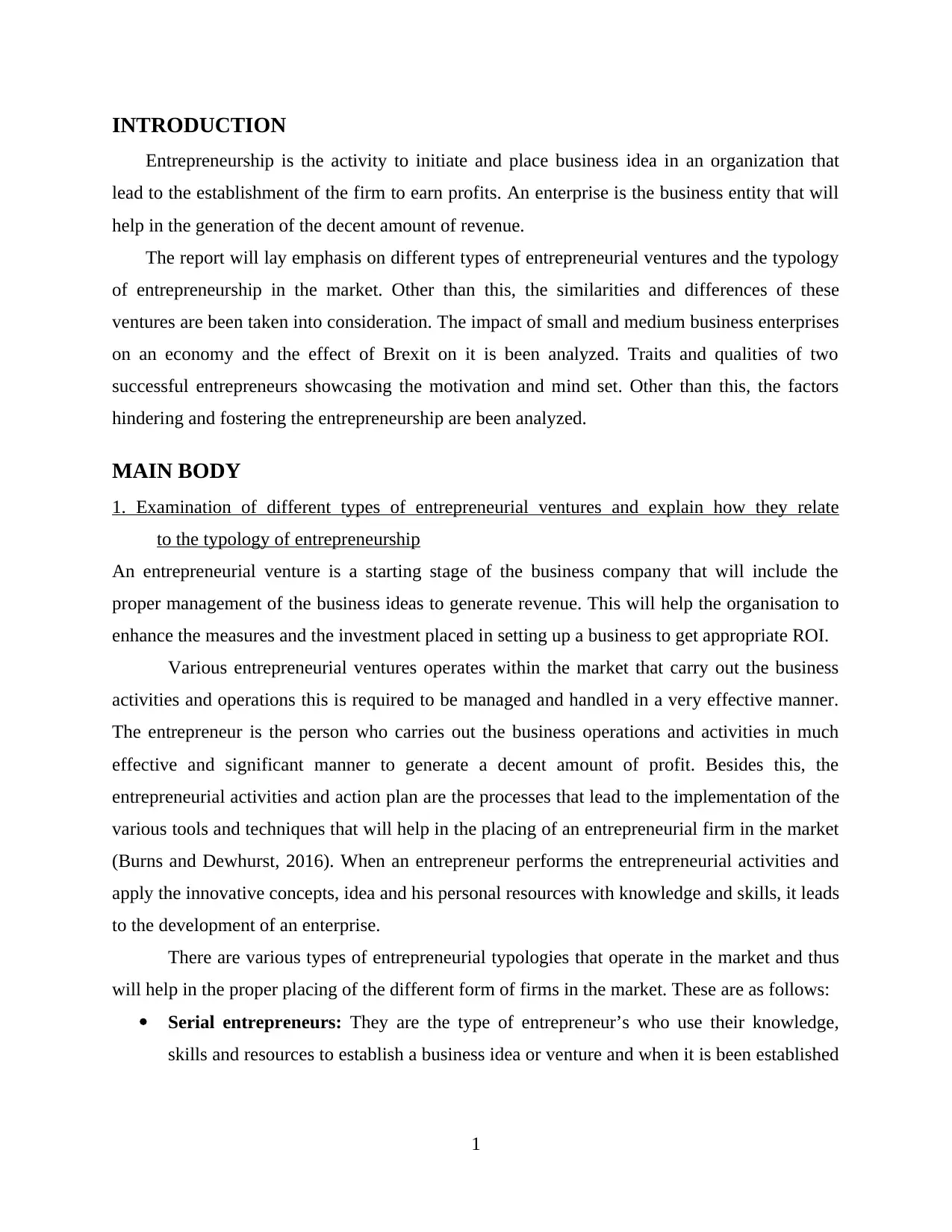
INTRODUCTION
Entrepreneurship is the activity to initiate and place business idea in an organization that
lead to the establishment of the firm to earn profits. An enterprise is the business entity that will
help in the generation of the decent amount of revenue.
The report will lay emphasis on different types of entrepreneurial ventures and the typology
of entrepreneurship in the market. Other than this, the similarities and differences of these
ventures are been taken into consideration. The impact of small and medium business enterprises
on an economy and the effect of Brexit on it is been analyzed. Traits and qualities of two
successful entrepreneurs showcasing the motivation and mind set. Other than this, the factors
hindering and fostering the entrepreneurship are been analyzed.
MAIN BODY
1. Examination of different types of entrepreneurial ventures and explain how they relate
to the typology of entrepreneurship
An entrepreneurial venture is a starting stage of the business company that will include the
proper management of the business ideas to generate revenue. This will help the organisation to
enhance the measures and the investment placed in setting up a business to get appropriate ROI.
Various entrepreneurial ventures operates within the market that carry out the business
activities and operations this is required to be managed and handled in a very effective manner.
The entrepreneur is the person who carries out the business operations and activities in much
effective and significant manner to generate a decent amount of profit. Besides this, the
entrepreneurial activities and action plan are the processes that lead to the implementation of the
various tools and techniques that will help in the placing of an entrepreneurial firm in the market
(Burns and Dewhurst, 2016). When an entrepreneur performs the entrepreneurial activities and
apply the innovative concepts, idea and his personal resources with knowledge and skills, it leads
to the development of an enterprise.
There are various types of entrepreneurial typologies that operate in the market and thus
will help in the proper placing of the different form of firms in the market. These are as follows:
Serial entrepreneurs: They are the type of entrepreneur’s who use their knowledge,
skills and resources to establish a business idea or venture and when it is been established
1
Entrepreneurship is the activity to initiate and place business idea in an organization that
lead to the establishment of the firm to earn profits. An enterprise is the business entity that will
help in the generation of the decent amount of revenue.
The report will lay emphasis on different types of entrepreneurial ventures and the typology
of entrepreneurship in the market. Other than this, the similarities and differences of these
ventures are been taken into consideration. The impact of small and medium business enterprises
on an economy and the effect of Brexit on it is been analyzed. Traits and qualities of two
successful entrepreneurs showcasing the motivation and mind set. Other than this, the factors
hindering and fostering the entrepreneurship are been analyzed.
MAIN BODY
1. Examination of different types of entrepreneurial ventures and explain how they relate
to the typology of entrepreneurship
An entrepreneurial venture is a starting stage of the business company that will include the
proper management of the business ideas to generate revenue. This will help the organisation to
enhance the measures and the investment placed in setting up a business to get appropriate ROI.
Various entrepreneurial ventures operates within the market that carry out the business
activities and operations this is required to be managed and handled in a very effective manner.
The entrepreneur is the person who carries out the business operations and activities in much
effective and significant manner to generate a decent amount of profit. Besides this, the
entrepreneurial activities and action plan are the processes that lead to the implementation of the
various tools and techniques that will help in the placing of an entrepreneurial firm in the market
(Burns and Dewhurst, 2016). When an entrepreneur performs the entrepreneurial activities and
apply the innovative concepts, idea and his personal resources with knowledge and skills, it leads
to the development of an enterprise.
There are various types of entrepreneurial typologies that operate in the market and thus
will help in the proper placing of the different form of firms in the market. These are as follows:
Serial entrepreneurs: They are the type of entrepreneur’s who use their knowledge,
skills and resources to establish a business idea or venture and when it is been established
1
⊘ This is a preview!⊘
Do you want full access?
Subscribe today to unlock all pages.

Trusted by 1+ million students worldwide
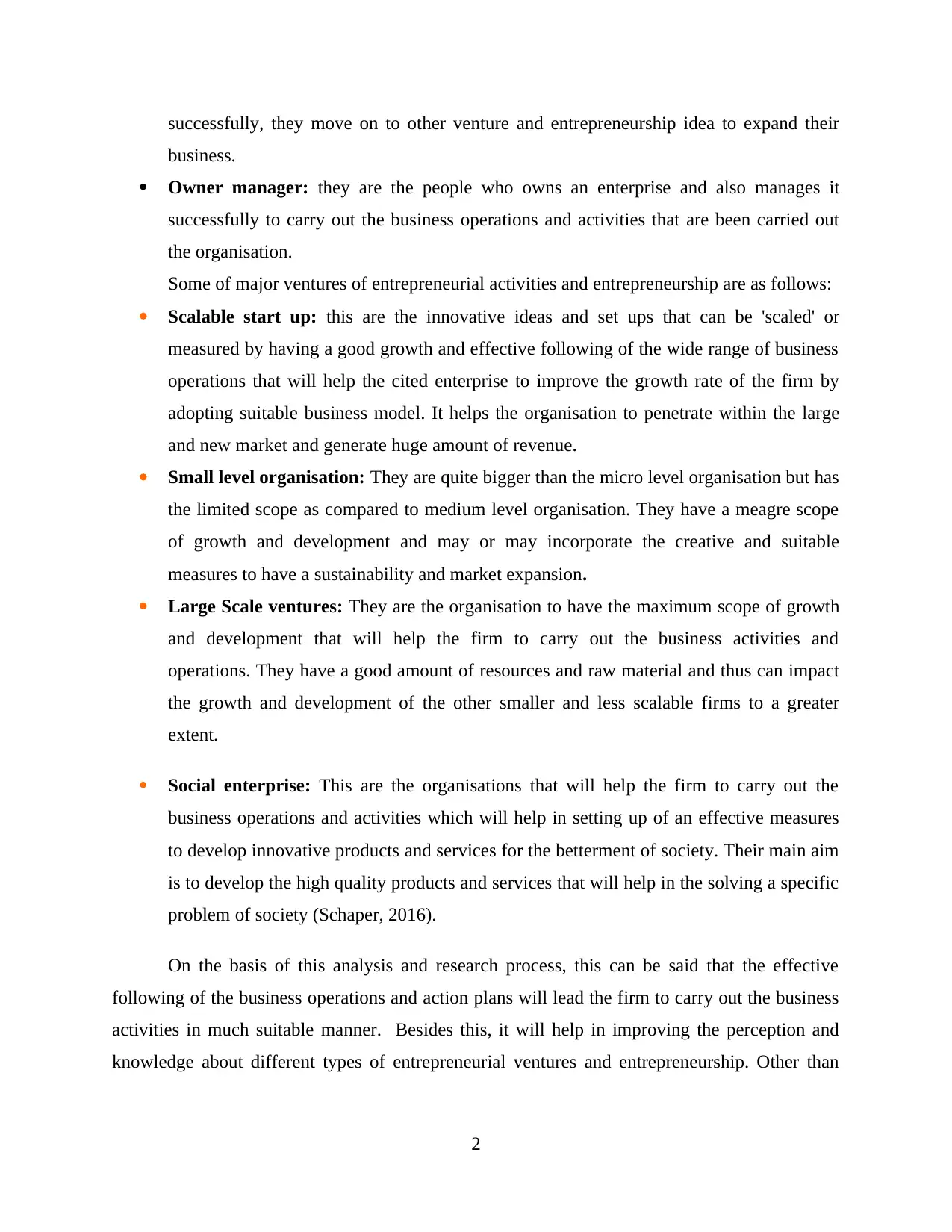
successfully, they move on to other venture and entrepreneurship idea to expand their
business.
Owner manager: they are the people who owns an enterprise and also manages it
successfully to carry out the business operations and activities that are been carried out
the organisation.
Some of major ventures of entrepreneurial activities and entrepreneurship are as follows:
Scalable start up: this are the innovative ideas and set ups that can be 'scaled' or
measured by having a good growth and effective following of the wide range of business
operations that will help the cited enterprise to improve the growth rate of the firm by
adopting suitable business model. It helps the organisation to penetrate within the large
and new market and generate huge amount of revenue.
Small level organisation: They are quite bigger than the micro level organisation but has
the limited scope as compared to medium level organisation. They have a meagre scope
of growth and development and may or may incorporate the creative and suitable
measures to have a sustainability and market expansion.
Large Scale ventures: They are the organisation to have the maximum scope of growth
and development that will help the firm to carry out the business activities and
operations. They have a good amount of resources and raw material and thus can impact
the growth and development of the other smaller and less scalable firms to a greater
extent.
Social enterprise: This are the organisations that will help the firm to carry out the
business operations and activities which will help in setting up of an effective measures
to develop innovative products and services for the betterment of society. Their main aim
is to develop the high quality products and services that will help in the solving a specific
problem of society (Schaper, 2016).
On the basis of this analysis and research process, this can be said that the effective
following of the business operations and action plans will lead the firm to carry out the business
activities in much suitable manner. Besides this, it will help in improving the perception and
knowledge about different types of entrepreneurial ventures and entrepreneurship. Other than
2
business.
Owner manager: they are the people who owns an enterprise and also manages it
successfully to carry out the business operations and activities that are been carried out
the organisation.
Some of major ventures of entrepreneurial activities and entrepreneurship are as follows:
Scalable start up: this are the innovative ideas and set ups that can be 'scaled' or
measured by having a good growth and effective following of the wide range of business
operations that will help the cited enterprise to improve the growth rate of the firm by
adopting suitable business model. It helps the organisation to penetrate within the large
and new market and generate huge amount of revenue.
Small level organisation: They are quite bigger than the micro level organisation but has
the limited scope as compared to medium level organisation. They have a meagre scope
of growth and development and may or may incorporate the creative and suitable
measures to have a sustainability and market expansion.
Large Scale ventures: They are the organisation to have the maximum scope of growth
and development that will help the firm to carry out the business activities and
operations. They have a good amount of resources and raw material and thus can impact
the growth and development of the other smaller and less scalable firms to a greater
extent.
Social enterprise: This are the organisations that will help the firm to carry out the
business operations and activities which will help in setting up of an effective measures
to develop innovative products and services for the betterment of society. Their main aim
is to develop the high quality products and services that will help in the solving a specific
problem of society (Schaper, 2016).
On the basis of this analysis and research process, this can be said that the effective
following of the business operations and action plans will lead the firm to carry out the business
activities in much suitable manner. Besides this, it will help in improving the perception and
knowledge about different types of entrepreneurial ventures and entrepreneurship. Other than
2
Paraphrase This Document
Need a fresh take? Get an instant paraphrase of this document with our AI Paraphraser
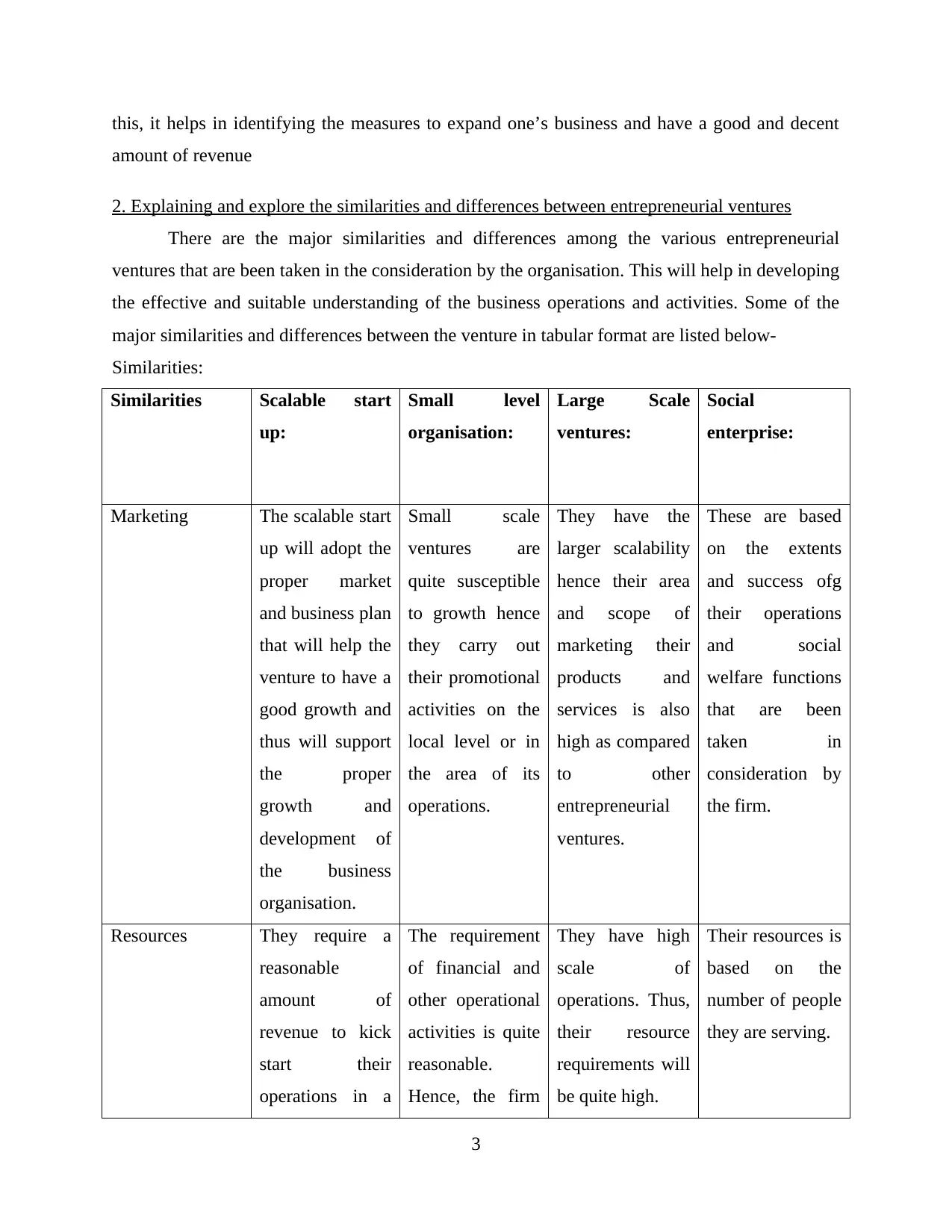
this, it helps in identifying the measures to expand one’s business and have a good and decent
amount of revenue
2. Explaining and explore the similarities and differences between entrepreneurial ventures
There are the major similarities and differences among the various entrepreneurial
ventures that are been taken in the consideration by the organisation. This will help in developing
the effective and suitable understanding of the business operations and activities. Some of the
major similarities and differences between the venture in tabular format are listed below-
Similarities:
Similarities Scalable start
up:
Small level
organisation:
Large Scale
ventures:
Social
enterprise:
Marketing The scalable start
up will adopt the
proper market
and business plan
that will help the
venture to have a
good growth and
thus will support
the proper
growth and
development of
the business
organisation.
Small scale
ventures are
quite susceptible
to growth hence
they carry out
their promotional
activities on the
local level or in
the area of its
operations.
They have the
larger scalability
hence their area
and scope of
marketing their
products and
services is also
high as compared
to other
entrepreneurial
ventures.
These are based
on the extents
and success ofg
their operations
and social
welfare functions
that are been
taken in
consideration by
the firm.
Resources They require a
reasonable
amount of
revenue to kick
start their
operations in a
The requirement
of financial and
other operational
activities is quite
reasonable.
Hence, the firm
They have high
scale of
operations. Thus,
their resource
requirements will
be quite high.
Their resources is
based on the
number of people
they are serving.
3
amount of revenue
2. Explaining and explore the similarities and differences between entrepreneurial ventures
There are the major similarities and differences among the various entrepreneurial
ventures that are been taken in the consideration by the organisation. This will help in developing
the effective and suitable understanding of the business operations and activities. Some of the
major similarities and differences between the venture in tabular format are listed below-
Similarities:
Similarities Scalable start
up:
Small level
organisation:
Large Scale
ventures:
Social
enterprise:
Marketing The scalable start
up will adopt the
proper market
and business plan
that will help the
venture to have a
good growth and
thus will support
the proper
growth and
development of
the business
organisation.
Small scale
ventures are
quite susceptible
to growth hence
they carry out
their promotional
activities on the
local level or in
the area of its
operations.
They have the
larger scalability
hence their area
and scope of
marketing their
products and
services is also
high as compared
to other
entrepreneurial
ventures.
These are based
on the extents
and success ofg
their operations
and social
welfare functions
that are been
taken in
consideration by
the firm.
Resources They require a
reasonable
amount of
revenue to kick
start their
operations in a
The requirement
of financial and
other operational
activities is quite
reasonable.
Hence, the firm
They have high
scale of
operations. Thus,
their resource
requirements will
be quite high.
Their resources is
based on the
number of people
they are serving.
3
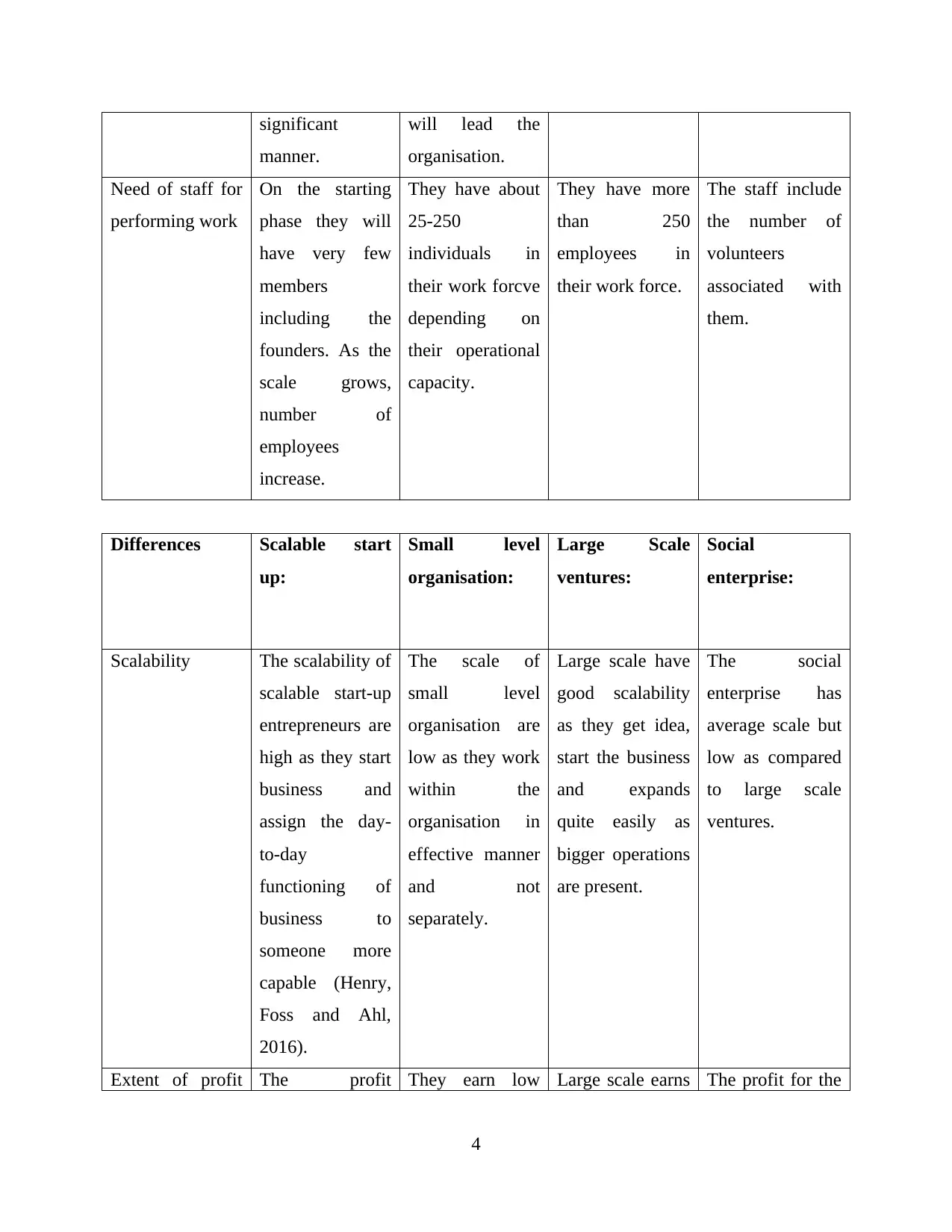
significant
manner.
will lead the
organisation.
Need of staff for
performing work
On the starting
phase they will
have very few
members
including the
founders. As the
scale grows,
number of
employees
increase.
They have about
25-250
individuals in
their work forcve
depending on
their operational
capacity.
They have more
than 250
employees in
their work force.
The staff include
the number of
volunteers
associated with
them.
Differences Scalable start
up:
Small level
organisation:
Large Scale
ventures:
Social
enterprise:
Scalability The scalability of
scalable start-up
entrepreneurs are
high as they start
business and
assign the day-
to-day
functioning of
business to
someone more
capable (Henry,
Foss and Ahl,
2016).
The scale of
small level
organisation are
low as they work
within the
organisation in
effective manner
and not
separately.
Large scale have
good scalability
as they get idea,
start the business
and expands
quite easily as
bigger operations
are present.
The social
enterprise has
average scale but
low as compared
to large scale
ventures.
Extent of profit The profit They earn low Large scale earns The profit for the
4
manner.
will lead the
organisation.
Need of staff for
performing work
On the starting
phase they will
have very few
members
including the
founders. As the
scale grows,
number of
employees
increase.
They have about
25-250
individuals in
their work forcve
depending on
their operational
capacity.
They have more
than 250
employees in
their work force.
The staff include
the number of
volunteers
associated with
them.
Differences Scalable start
up:
Small level
organisation:
Large Scale
ventures:
Social
enterprise:
Scalability The scalability of
scalable start-up
entrepreneurs are
high as they start
business and
assign the day-
to-day
functioning of
business to
someone more
capable (Henry,
Foss and Ahl,
2016).
The scale of
small level
organisation are
low as they work
within the
organisation in
effective manner
and not
separately.
Large scale have
good scalability
as they get idea,
start the business
and expands
quite easily as
bigger operations
are present.
The social
enterprise has
average scale but
low as compared
to large scale
ventures.
Extent of profit The profit They earn low Large scale earns The profit for the
4
⊘ This is a preview!⊘
Do you want full access?
Subscribe today to unlock all pages.

Trusted by 1+ million students worldwide
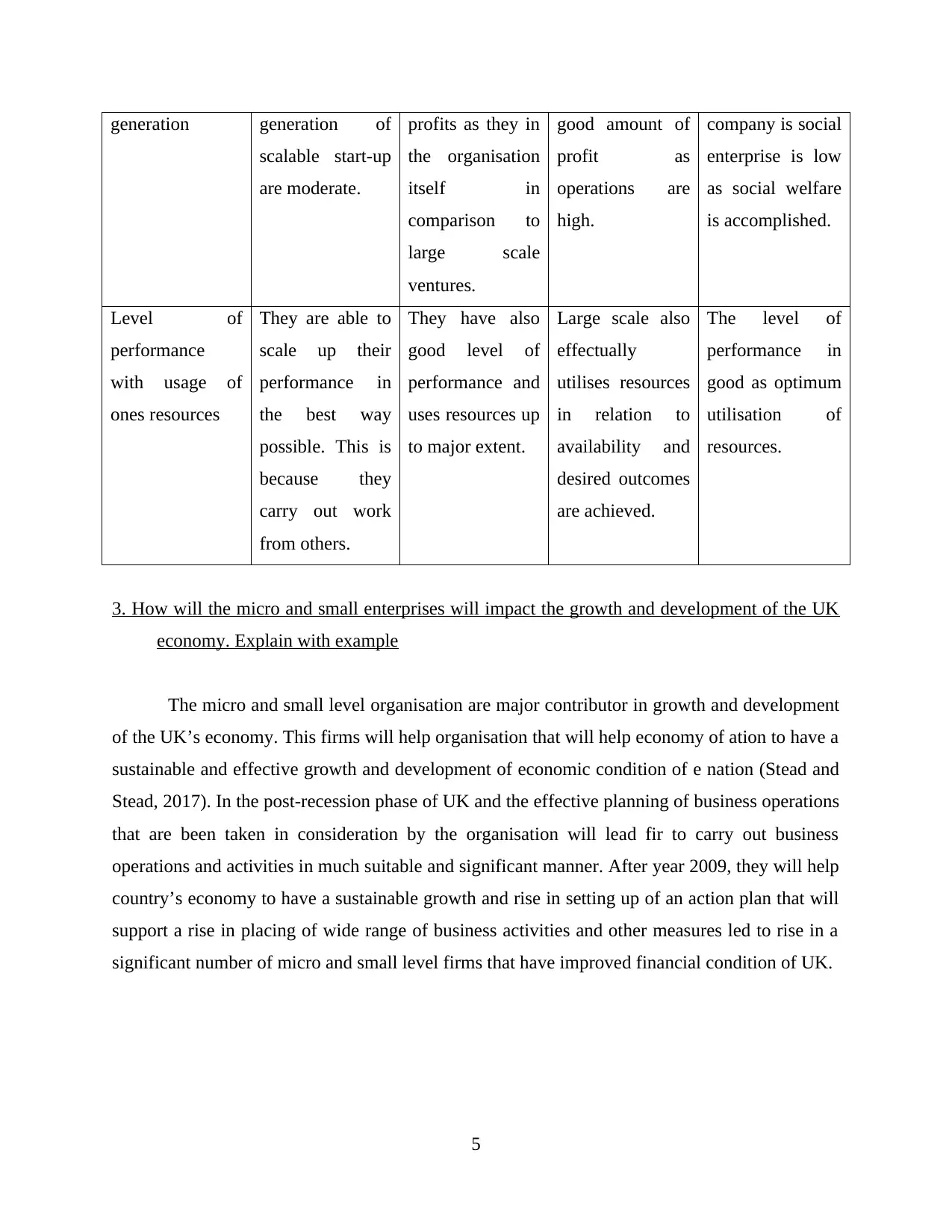
generation generation of
scalable start-up
are moderate.
profits as they in
the organisation
itself in
comparison to
large scale
ventures.
good amount of
profit as
operations are
high.
company is social
enterprise is low
as social welfare
is accomplished.
Level of
performance
with usage of
ones resources
They are able to
scale up their
performance in
the best way
possible. This is
because they
carry out work
from others.
They have also
good level of
performance and
uses resources up
to major extent.
Large scale also
effectually
utilises resources
in relation to
availability and
desired outcomes
are achieved.
The level of
performance in
good as optimum
utilisation of
resources.
3. How will the micro and small enterprises will impact the growth and development of the UK
economy. Explain with example
The micro and small level organisation are major contributor in growth and development
of the UK’s economy. This firms will help organisation that will help economy of ation to have a
sustainable and effective growth and development of economic condition of e nation (Stead and
Stead, 2017). In the post-recession phase of UK and the effective planning of business operations
that are been taken in consideration by the organisation will lead fir to carry out business
operations and activities in much suitable and significant manner. After year 2009, they will help
country’s economy to have a sustainable growth and rise in setting up of an action plan that will
support a rise in placing of wide range of business activities and other measures led to rise in a
significant number of micro and small level firms that have improved financial condition of UK.
5
scalable start-up
are moderate.
profits as they in
the organisation
itself in
comparison to
large scale
ventures.
good amount of
profit as
operations are
high.
company is social
enterprise is low
as social welfare
is accomplished.
Level of
performance
with usage of
ones resources
They are able to
scale up their
performance in
the best way
possible. This is
because they
carry out work
from others.
They have also
good level of
performance and
uses resources up
to major extent.
Large scale also
effectually
utilises resources
in relation to
availability and
desired outcomes
are achieved.
The level of
performance in
good as optimum
utilisation of
resources.
3. How will the micro and small enterprises will impact the growth and development of the UK
economy. Explain with example
The micro and small level organisation are major contributor in growth and development
of the UK’s economy. This firms will help organisation that will help economy of ation to have a
sustainable and effective growth and development of economic condition of e nation (Stead and
Stead, 2017). In the post-recession phase of UK and the effective planning of business operations
that are been taken in consideration by the organisation will lead fir to carry out business
operations and activities in much suitable and significant manner. After year 2009, they will help
country’s economy to have a sustainable growth and rise in setting up of an action plan that will
support a rise in placing of wide range of business activities and other measures led to rise in a
significant number of micro and small level firms that have improved financial condition of UK.
5
Paraphrase This Document
Need a fresh take? Get an instant paraphrase of this document with our AI Paraphraser
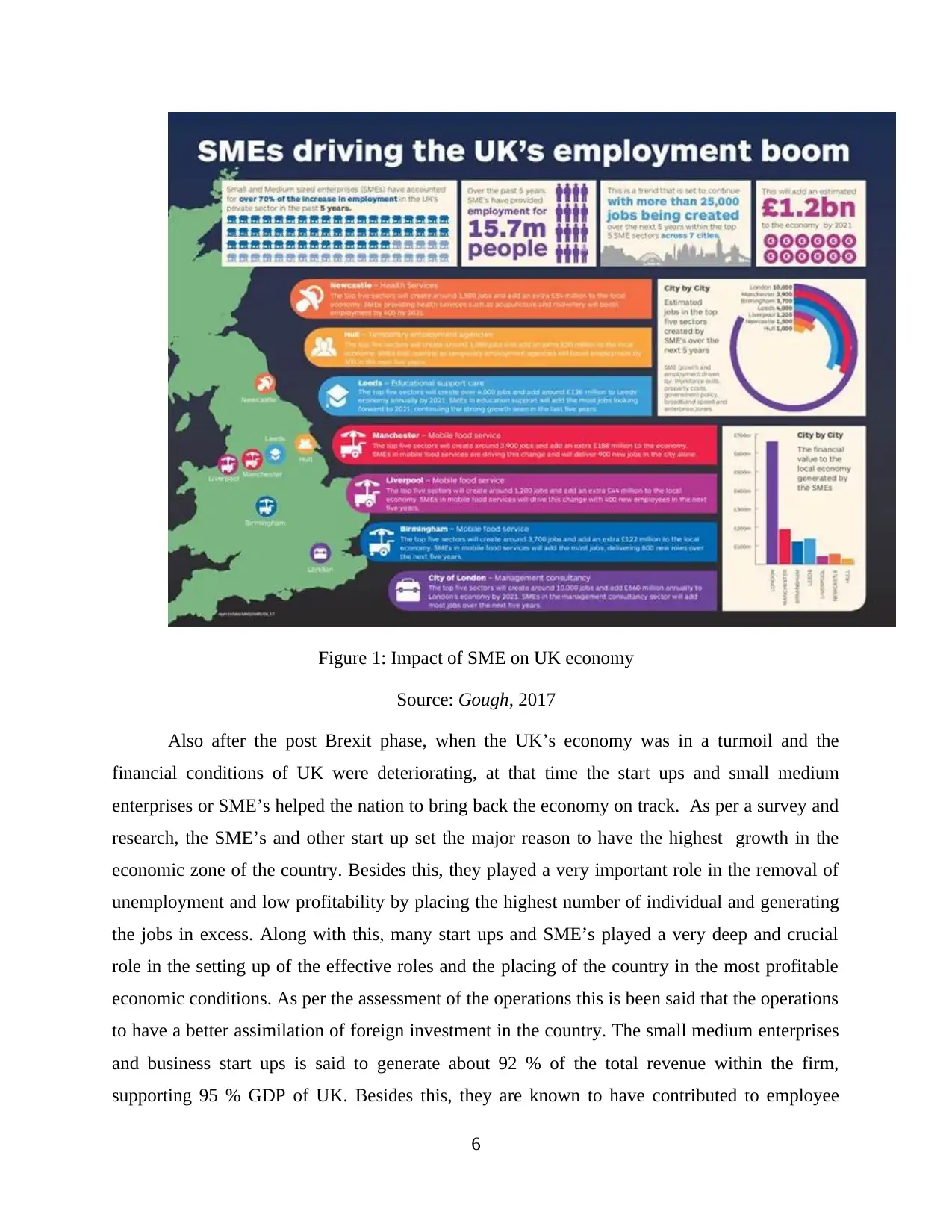
Figure 1: Impact of SME on UK economy
Source: Gough, 2017
Also after the post Brexit phase, when the UK’s economy was in a turmoil and the
financial conditions of UK were deteriorating, at that time the start ups and small medium
enterprises or SME’s helped the nation to bring back the economy on track. As per a survey and
research, the SME’s and other start up set the major reason to have the highest growth in the
economic zone of the country. Besides this, they played a very important role in the removal of
unemployment and low profitability by placing the highest number of individual and generating
the jobs in excess. Along with this, many start ups and SME’s played a very deep and crucial
role in the setting up of the effective roles and the placing of the country in the most profitable
economic conditions. As per the assessment of the operations this is been said that the operations
to have a better assimilation of foreign investment in the country. The small medium enterprises
and business start ups is said to generate about 92 % of the total revenue within the firm,
supporting 95 % GDP of UK. Besides this, they are known to have contributed to employee
6
Source: Gough, 2017
Also after the post Brexit phase, when the UK’s economy was in a turmoil and the
financial conditions of UK were deteriorating, at that time the start ups and small medium
enterprises or SME’s helped the nation to bring back the economy on track. As per a survey and
research, the SME’s and other start up set the major reason to have the highest growth in the
economic zone of the country. Besides this, they played a very important role in the removal of
unemployment and low profitability by placing the highest number of individual and generating
the jobs in excess. Along with this, many start ups and SME’s played a very deep and crucial
role in the setting up of the effective roles and the placing of the country in the most profitable
economic conditions. As per the assessment of the operations this is been said that the operations
to have a better assimilation of foreign investment in the country. The small medium enterprises
and business start ups is said to generate about 92 % of the total revenue within the firm,
supporting 95 % GDP of UK. Besides this, they are known to have contributed to employee
6
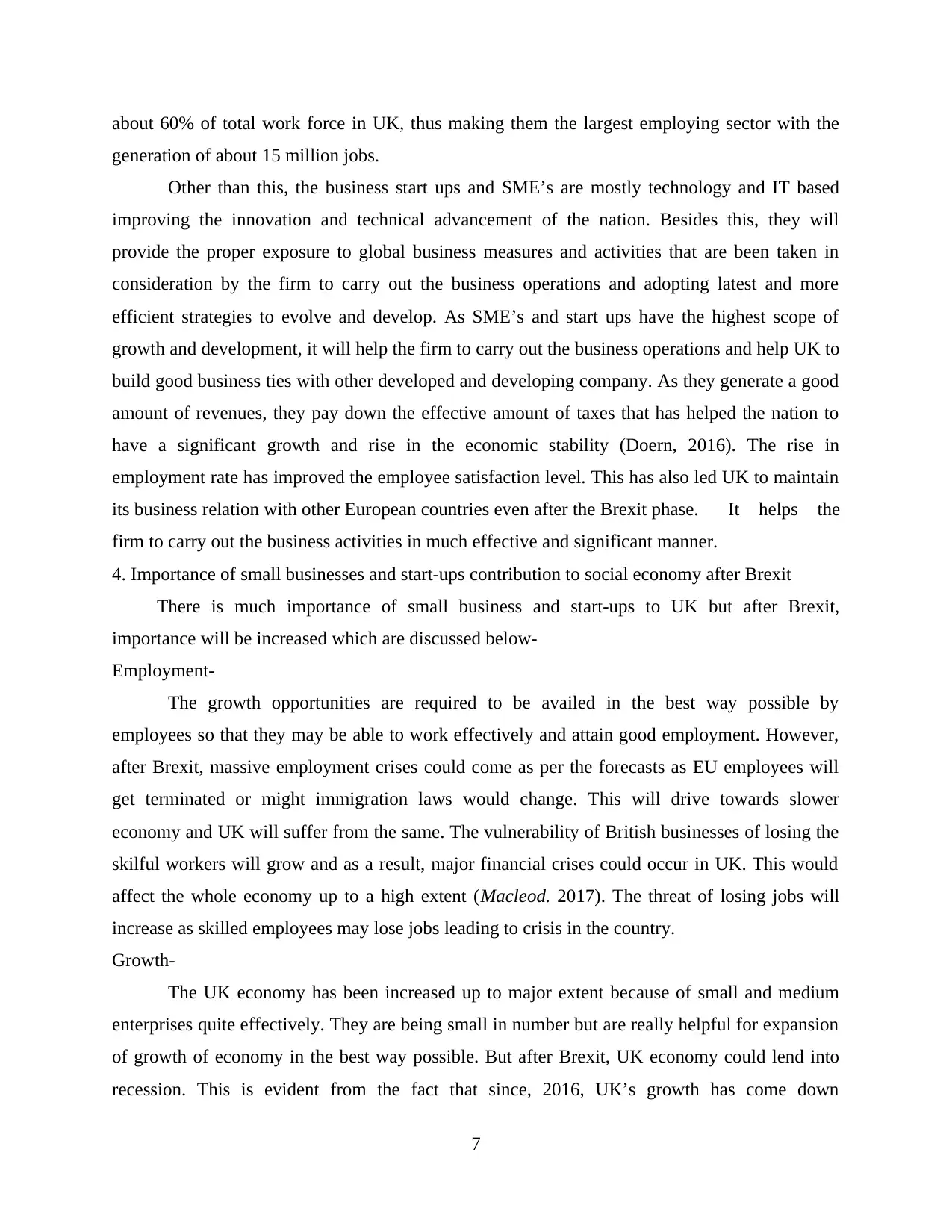
about 60% of total work force in UK, thus making them the largest employing sector with the
generation of about 15 million jobs.
Other than this, the business start ups and SME’s are mostly technology and IT based
improving the innovation and technical advancement of the nation. Besides this, they will
provide the proper exposure to global business measures and activities that are been taken in
consideration by the firm to carry out the business operations and adopting latest and more
efficient strategies to evolve and develop. As SME’s and start ups have the highest scope of
growth and development, it will help the firm to carry out the business operations and help UK to
build good business ties with other developed and developing company. As they generate a good
amount of revenues, they pay down the effective amount of taxes that has helped the nation to
have a significant growth and rise in the economic stability (Doern, 2016). The rise in
employment rate has improved the employee satisfaction level. This has also led UK to maintain
its business relation with other European countries even after the Brexit phase. It helps the
firm to carry out the business activities in much effective and significant manner.
4. Importance of small businesses and start-ups contribution to social economy after Brexit
There is much importance of small business and start-ups to UK but after Brexit,
importance will be increased which are discussed below-
Employment-
The growth opportunities are required to be availed in the best way possible by
employees so that they may be able to work effectively and attain good employment. However,
after Brexit, massive employment crises could come as per the forecasts as EU employees will
get terminated or might immigration laws would change. This will drive towards slower
economy and UK will suffer from the same. The vulnerability of British businesses of losing the
skilful workers will grow and as a result, major financial crises could occur in UK. This would
affect the whole economy up to a high extent (Macleod. 2017). The threat of losing jobs will
increase as skilled employees may lose jobs leading to crisis in the country.
Growth-
The UK economy has been increased up to major extent because of small and medium
enterprises quite effectively. They are being small in number but are really helpful for expansion
of growth of economy in the best way possible. But after Brexit, UK economy could lend into
recession. This is evident from the fact that since, 2016, UK’s growth has come down
7
generation of about 15 million jobs.
Other than this, the business start ups and SME’s are mostly technology and IT based
improving the innovation and technical advancement of the nation. Besides this, they will
provide the proper exposure to global business measures and activities that are been taken in
consideration by the firm to carry out the business operations and adopting latest and more
efficient strategies to evolve and develop. As SME’s and start ups have the highest scope of
growth and development, it will help the firm to carry out the business operations and help UK to
build good business ties with other developed and developing company. As they generate a good
amount of revenues, they pay down the effective amount of taxes that has helped the nation to
have a significant growth and rise in the economic stability (Doern, 2016). The rise in
employment rate has improved the employee satisfaction level. This has also led UK to maintain
its business relation with other European countries even after the Brexit phase. It helps the
firm to carry out the business activities in much effective and significant manner.
4. Importance of small businesses and start-ups contribution to social economy after Brexit
There is much importance of small business and start-ups to UK but after Brexit,
importance will be increased which are discussed below-
Employment-
The growth opportunities are required to be availed in the best way possible by
employees so that they may be able to work effectively and attain good employment. However,
after Brexit, massive employment crises could come as per the forecasts as EU employees will
get terminated or might immigration laws would change. This will drive towards slower
economy and UK will suffer from the same. The vulnerability of British businesses of losing the
skilful workers will grow and as a result, major financial crises could occur in UK. This would
affect the whole economy up to a high extent (Macleod. 2017). The threat of losing jobs will
increase as skilled employees may lose jobs leading to crisis in the country.
Growth-
The UK economy has been increased up to major extent because of small and medium
enterprises quite effectively. They are being small in number but are really helpful for expansion
of growth of economy in the best way possible. But after Brexit, UK economy could lend into
recession. This is evident from the fact that since, 2016, UK’s growth has come down
7
⊘ This is a preview!⊘
Do you want full access?
Subscribe today to unlock all pages.

Trusted by 1+ million students worldwide
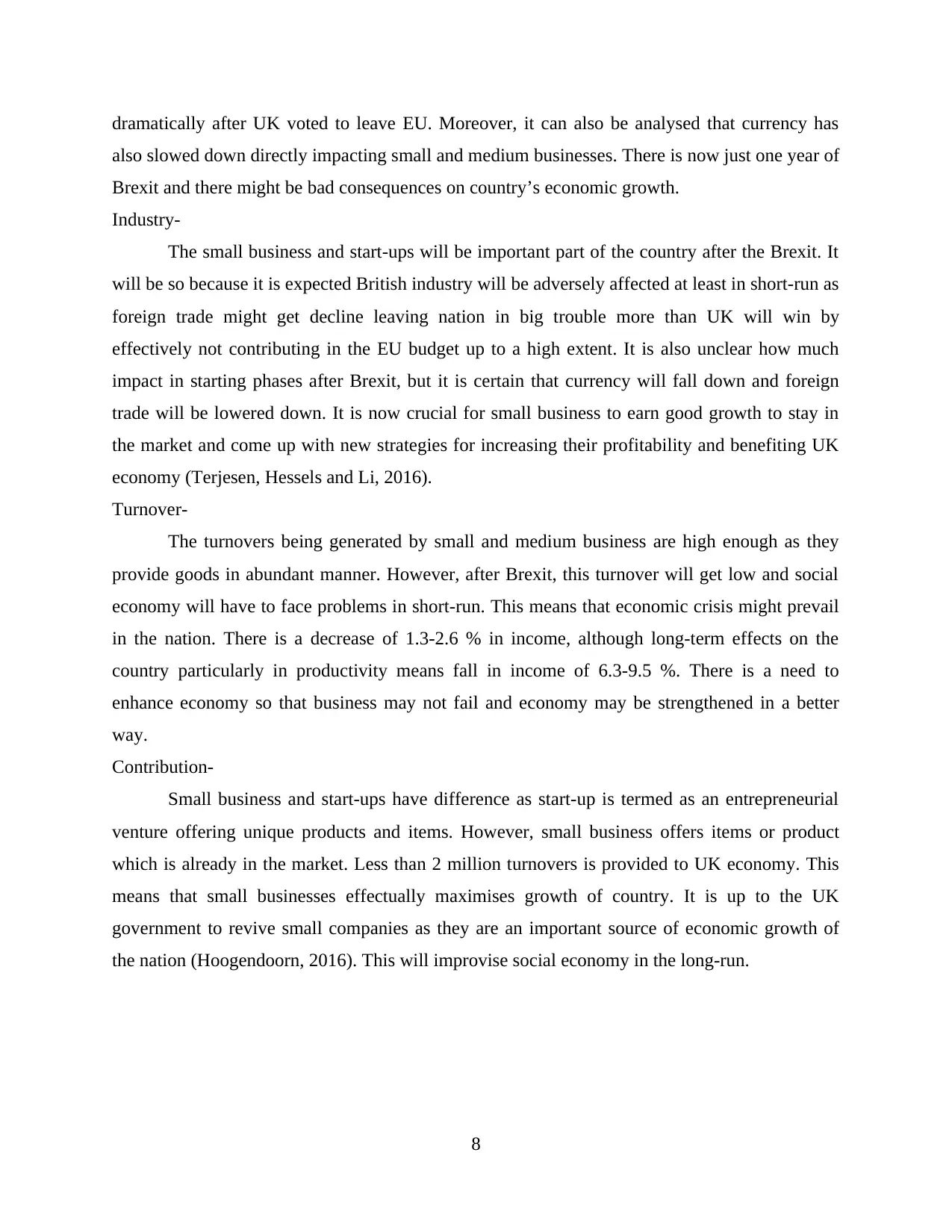
dramatically after UK voted to leave EU. Moreover, it can also be analysed that currency has
also slowed down directly impacting small and medium businesses. There is now just one year of
Brexit and there might be bad consequences on country’s economic growth.
Industry-
The small business and start-ups will be important part of the country after the Brexit. It
will be so because it is expected British industry will be adversely affected at least in short-run as
foreign trade might get decline leaving nation in big trouble more than UK will win by
effectively not contributing in the EU budget up to a high extent. It is also unclear how much
impact in starting phases after Brexit, but it is certain that currency will fall down and foreign
trade will be lowered down. It is now crucial for small business to earn good growth to stay in
the market and come up with new strategies for increasing their profitability and benefiting UK
economy (Terjesen, Hessels and Li, 2016).
Turnover-
The turnovers being generated by small and medium business are high enough as they
provide goods in abundant manner. However, after Brexit, this turnover will get low and social
economy will have to face problems in short-run. This means that economic crisis might prevail
in the nation. There is a decrease of 1.3-2.6 % in income, although long-term effects on the
country particularly in productivity means fall in income of 6.3-9.5 %. There is a need to
enhance economy so that business may not fail and economy may be strengthened in a better
way.
Contribution-
Small business and start-ups have difference as start-up is termed as an entrepreneurial
venture offering unique products and items. However, small business offers items or product
which is already in the market. Less than 2 million turnovers is provided to UK economy. This
means that small businesses effectually maximises growth of country. It is up to the UK
government to revive small companies as they are an important source of economic growth of
the nation (Hoogendoorn, 2016). This will improvise social economy in the long-run.
8
also slowed down directly impacting small and medium businesses. There is now just one year of
Brexit and there might be bad consequences on country’s economic growth.
Industry-
The small business and start-ups will be important part of the country after the Brexit. It
will be so because it is expected British industry will be adversely affected at least in short-run as
foreign trade might get decline leaving nation in big trouble more than UK will win by
effectively not contributing in the EU budget up to a high extent. It is also unclear how much
impact in starting phases after Brexit, but it is certain that currency will fall down and foreign
trade will be lowered down. It is now crucial for small business to earn good growth to stay in
the market and come up with new strategies for increasing their profitability and benefiting UK
economy (Terjesen, Hessels and Li, 2016).
Turnover-
The turnovers being generated by small and medium business are high enough as they
provide goods in abundant manner. However, after Brexit, this turnover will get low and social
economy will have to face problems in short-run. This means that economic crisis might prevail
in the nation. There is a decrease of 1.3-2.6 % in income, although long-term effects on the
country particularly in productivity means fall in income of 6.3-9.5 %. There is a need to
enhance economy so that business may not fail and economy may be strengthened in a better
way.
Contribution-
Small business and start-ups have difference as start-up is termed as an entrepreneurial
venture offering unique products and items. However, small business offers items or product
which is already in the market. Less than 2 million turnovers is provided to UK economy. This
means that small businesses effectually maximises growth of country. It is up to the UK
government to revive small companies as they are an important source of economic growth of
the nation (Hoogendoorn, 2016). This will improvise social economy in the long-run.
8
Paraphrase This Document
Need a fresh take? Get an instant paraphrase of this document with our AI Paraphraser
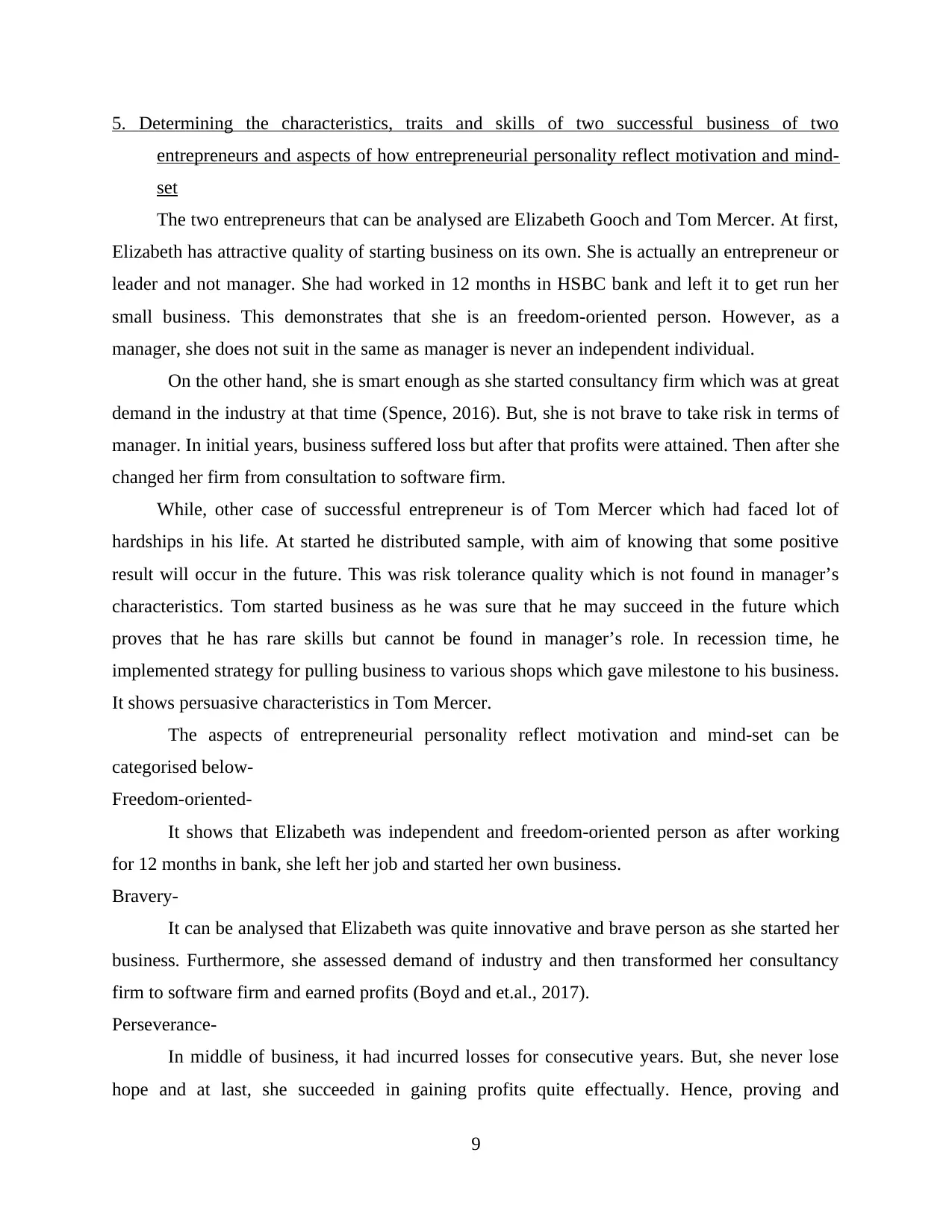
5. Determining the characteristics, traits and skills of two successful business of two
entrepreneurs and aspects of how entrepreneurial personality reflect motivation and mind-
set
The two entrepreneurs that can be analysed are Elizabeth Gooch and Tom Mercer. At first,
Elizabeth has attractive quality of starting business on its own. She is actually an entrepreneur or
leader and not manager. She had worked in 12 months in HSBC bank and left it to get run her
small business. This demonstrates that she is an freedom-oriented person. However, as a
manager, she does not suit in the same as manager is never an independent individual.
On the other hand, she is smart enough as she started consultancy firm which was at great
demand in the industry at that time (Spence, 2016). But, she is not brave to take risk in terms of
manager. In initial years, business suffered loss but after that profits were attained. Then after she
changed her firm from consultation to software firm.
While, other case of successful entrepreneur is of Tom Mercer which had faced lot of
hardships in his life. At started he distributed sample, with aim of knowing that some positive
result will occur in the future. This was risk tolerance quality which is not found in manager’s
characteristics. Tom started business as he was sure that he may succeed in the future which
proves that he has rare skills but cannot be found in manager’s role. In recession time, he
implemented strategy for pulling business to various shops which gave milestone to his business.
It shows persuasive characteristics in Tom Mercer.
The aspects of entrepreneurial personality reflect motivation and mind-set can be
categorised below-
Freedom-oriented-
It shows that Elizabeth was independent and freedom-oriented person as after working
for 12 months in bank, she left her job and started her own business.
Bravery-
It can be analysed that Elizabeth was quite innovative and brave person as she started her
business. Furthermore, she assessed demand of industry and then transformed her consultancy
firm to software firm and earned profits (Boyd and et.al., 2017).
Perseverance-
In middle of business, it had incurred losses for consecutive years. But, she never lose
hope and at last, she succeeded in gaining profits quite effectually. Hence, proving and
9
entrepreneurs and aspects of how entrepreneurial personality reflect motivation and mind-
set
The two entrepreneurs that can be analysed are Elizabeth Gooch and Tom Mercer. At first,
Elizabeth has attractive quality of starting business on its own. She is actually an entrepreneur or
leader and not manager. She had worked in 12 months in HSBC bank and left it to get run her
small business. This demonstrates that she is an freedom-oriented person. However, as a
manager, she does not suit in the same as manager is never an independent individual.
On the other hand, she is smart enough as she started consultancy firm which was at great
demand in the industry at that time (Spence, 2016). But, she is not brave to take risk in terms of
manager. In initial years, business suffered loss but after that profits were attained. Then after she
changed her firm from consultation to software firm.
While, other case of successful entrepreneur is of Tom Mercer which had faced lot of
hardships in his life. At started he distributed sample, with aim of knowing that some positive
result will occur in the future. This was risk tolerance quality which is not found in manager’s
characteristics. Tom started business as he was sure that he may succeed in the future which
proves that he has rare skills but cannot be found in manager’s role. In recession time, he
implemented strategy for pulling business to various shops which gave milestone to his business.
It shows persuasive characteristics in Tom Mercer.
The aspects of entrepreneurial personality reflect motivation and mind-set can be
categorised below-
Freedom-oriented-
It shows that Elizabeth was independent and freedom-oriented person as after working
for 12 months in bank, she left her job and started her own business.
Bravery-
It can be analysed that Elizabeth was quite innovative and brave person as she started her
business. Furthermore, she assessed demand of industry and then transformed her consultancy
firm to software firm and earned profits (Boyd and et.al., 2017).
Perseverance-
In middle of business, it had incurred losses for consecutive years. But, she never lose
hope and at last, she succeeded in gaining profits quite effectually. Hence, proving and
9
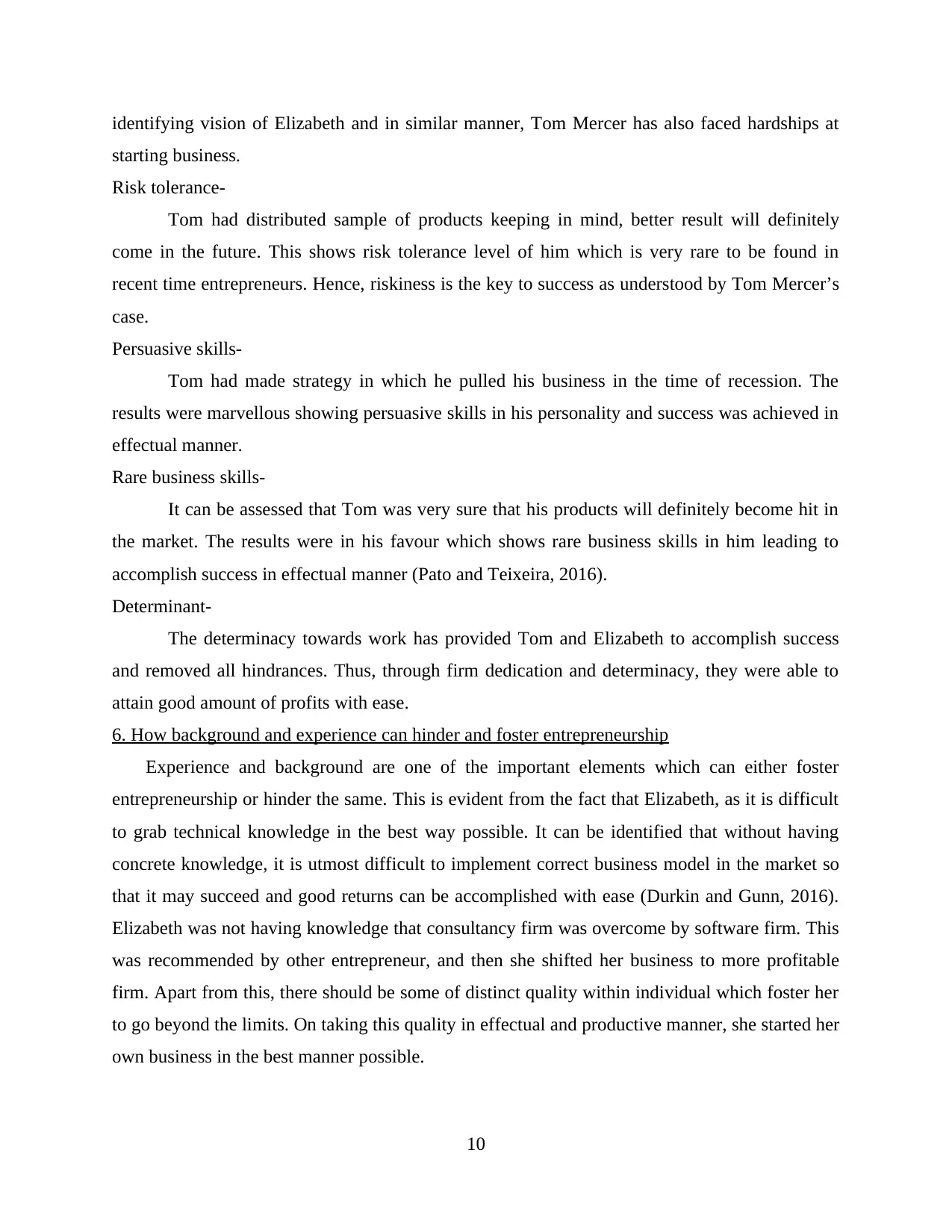
identifying vision of Elizabeth and in similar manner, Tom Mercer has also faced hardships at
starting business.
Risk tolerance-
Tom had distributed sample of products keeping in mind, better result will definitely
come in the future. This shows risk tolerance level of him which is very rare to be found in
recent time entrepreneurs. Hence, riskiness is the key to success as understood by Tom Mercer’s
case.
Persuasive skills-
Tom had made strategy in which he pulled his business in the time of recession. The
results were marvellous showing persuasive skills in his personality and success was achieved in
effectual manner.
Rare business skills-
It can be assessed that Tom was very sure that his products will definitely become hit in
the market. The results were in his favour which shows rare business skills in him leading to
accomplish success in effectual manner (Pato and Teixeira, 2016).
Determinant-
The determinacy towards work has provided Tom and Elizabeth to accomplish success
and removed all hindrances. Thus, through firm dedication and determinacy, they were able to
attain good amount of profits with ease.
6. How background and experience can hinder and foster entrepreneurship
Experience and background are one of the important elements which can either foster
entrepreneurship or hinder the same. This is evident from the fact that Elizabeth, as it is difficult
to grab technical knowledge in the best way possible. It can be identified that without having
concrete knowledge, it is utmost difficult to implement correct business model in the market so
that it may succeed and good returns can be accomplished with ease (Durkin and Gunn, 2016).
Elizabeth was not having knowledge that consultancy firm was overcome by software firm. This
was recommended by other entrepreneur, and then she shifted her business to more profitable
firm. Apart from this, there should be some of distinct quality within individual which foster her
to go beyond the limits. On taking this quality in effectual and productive manner, she started her
own business in the best manner possible.
10
starting business.
Risk tolerance-
Tom had distributed sample of products keeping in mind, better result will definitely
come in the future. This shows risk tolerance level of him which is very rare to be found in
recent time entrepreneurs. Hence, riskiness is the key to success as understood by Tom Mercer’s
case.
Persuasive skills-
Tom had made strategy in which he pulled his business in the time of recession. The
results were marvellous showing persuasive skills in his personality and success was achieved in
effectual manner.
Rare business skills-
It can be assessed that Tom was very sure that his products will definitely become hit in
the market. The results were in his favour which shows rare business skills in him leading to
accomplish success in effectual manner (Pato and Teixeira, 2016).
Determinant-
The determinacy towards work has provided Tom and Elizabeth to accomplish success
and removed all hindrances. Thus, through firm dedication and determinacy, they were able to
attain good amount of profits with ease.
6. How background and experience can hinder and foster entrepreneurship
Experience and background are one of the important elements which can either foster
entrepreneurship or hinder the same. This is evident from the fact that Elizabeth, as it is difficult
to grab technical knowledge in the best way possible. It can be identified that without having
concrete knowledge, it is utmost difficult to implement correct business model in the market so
that it may succeed and good returns can be accomplished with ease (Durkin and Gunn, 2016).
Elizabeth was not having knowledge that consultancy firm was overcome by software firm. This
was recommended by other entrepreneur, and then she shifted her business to more profitable
firm. Apart from this, there should be some of distinct quality within individual which foster her
to go beyond the limits. On taking this quality in effectual and productive manner, she started her
own business in the best manner possible.
10
⊘ This is a preview!⊘
Do you want full access?
Subscribe today to unlock all pages.

Trusted by 1+ million students worldwide
1 out of 16
Related Documents
Your All-in-One AI-Powered Toolkit for Academic Success.
+13062052269
info@desklib.com
Available 24*7 on WhatsApp / Email
![[object Object]](/_next/static/media/star-bottom.7253800d.svg)
Unlock your academic potential
Copyright © 2020–2026 A2Z Services. All Rights Reserved. Developed and managed by ZUCOL.





